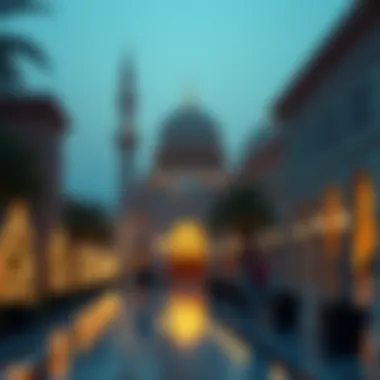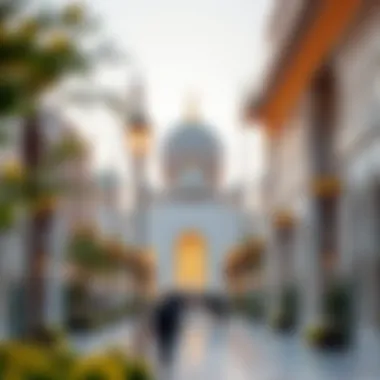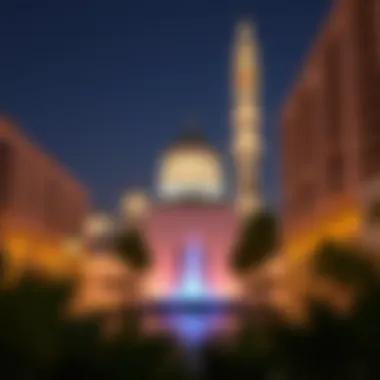UAE National Holidays 2023: Key Celebrations and Insights


Intro
The United Arab Emirates, a nation that epitomizes a blend of tradition and modernity, is known for its vibrant diversity and rich cultural tapestry. Each year, the UAE observes a range of national holidays that hold great significance not just for citizens but also for expatriates who call this land home. These holidays provide opportunities for communal celebrations, reflection on history, and the embrace of cultural traditions that have played a vital role in shaping the nation's identity.
In 2023, these holidays offer a fascinating glimpse into the customs and practices that define the UAE. From the festivities surrounding Eid Al Fitr and Eid Al Adha to the National Day celebrations, each holiday is imbued with its own unique history and meaning. Moreover, understanding these holidays serves a crucial purpose beyond cultural appreciation; they significantly impact various societal sectors, including the real estate market.
For investors, agents, and buyers, comprehending the interrelational dynamics between public holidays and market trends can lead to valuable insights. With the influx of visitors during these festive periods, the demand for temporary housing spikes, residential sales may rise, and new developments can see increased interest.
This article delves deep into the national holidays of the UAE in 2023, unraveling their cultural relevance and examining how they influence local customs, community spirit, and even the real estate market. By exploring the intricacies of these celebrations, we provide a well-rounded perspective aimed at investors, analysts, and managers, ensuring they stay informed and strategically positioned within the evolving landscape of UAE's socio-economic fabric.
Understanding the UAE National Holidays
Understanding the UAE's national holidays is more than just marking a few dates on the calendar; it’s about grasping the roots of a vibrant and diverse society. These holidays offer a lens through which one can view the evolution of the nation, revealing how historical events shape contemporary customs and practices. For investors, real estate agents, and other stakeholders in the UAE, knowing when these holidays occur and what they signify can aid in strategic planning.
Many of these holidays are steeped in tradition, reflecting the customs and values of the Emirati people. This cultural context is crucial for anyone aiming to engage meaningfully with local communities. Furthermore, understanding these holidays helps in recognizing fluctuating market dynamics during these periods, as business operations may halt or slow down. Thus, they play a significant role in forecasting economic trends.
Historical Context
The UAE's national holidays trace back to pivotal moments in the country's journey. The most significant of these is, of course, the UAE National Day, celebrated on December 2. This marks the day in 1971 when the seven emirates came together to form a unified nation. The day represents more than just a political milestone; it symbolizes national pride and unity. Understanding the context of this day can provide insights into the collective identity of the Emirati people and their sense of belonging.
Eid holidays, derived from Islamic traditions, also play a vital role in this historical narrative. Eid al-Fitr, which concludes the month of Ramadan, and Eid al-Adha, which honors the willingness of Ibrahim (Abraham) to sacrifice his son as an act of obedience to God, serve as reminders of faith and community cohesion. Their observance showcases the rich cultural tapestry of the UAE, as expatriate communities also partake in these celebrations, further blending diverse cultures.
Cultural Significance
The national holidays hold a mirror to the cultural ethos of the UAE. They are times for family gatherings, community events, and public celebrations that enhance social bonds. For instance, during Eid al-Adha, families often come together to share meals, participate in communal prayers, and extend their generosity to those in need through charitable acts. This reflects the deeply ingrained values of hospitality and charity in Emirati culture.
Moreover, these holidays provide an opportunity for cultural exchange, particularly among expatriates who reside in the UAE. Expatriates from various backgrounds celebrate alongside locals, which fosters inclusivity and mutual respect. Special events, such as fireworks shows and traditional performances, are organized, creating a festive atmosphere that can attract tourists as well. Thus, national holidays serve as a bridge, connecting different communities while nurturing a sense of shared identity.
Legal Framework
The legal framework governing national holidays in the UAE is as essential to understand as their historical or cultural significance. Each public holiday is officially designated by the government, with varying days off allocated for both public and private sectors. This legal recognition underscores the importance of these days within the framework of Emirati society.
For instance, the UAE Cabinet typically announces the holiday dates ahead of time, considering religious observances that can shift based on lunar sightings. The public sector enjoys designated days off, while private companies are encouraged to follow suit, although this can vary considerably. Familiarity with these regulations allows businesses to plan accordingly, impacting staffing and operations.
In sum, comprehension of the UAE's national holidays informs potential investors and stakeholders of the socio-economic fabric of the nation, ensuring that they can navigate the UAE’s unique marketplace with sensitivity and insight.
Major National Holidays in
Understanding the Major National Holidays in the UAE for 2023 provides a window into the cultural values and social fabric of this vibrant nation. These holidays are not merely days off work; they represent a rich amalgamation of tradition, faith, and national pride. Each holiday carries with it specific customs, practices, and intricate details that can significantly influence social dynamics, economic interactions, and community engagements.
These holidays also impact various sectors, especially tourism and real estate, which see heightened activity during these celebrations. For investors and stakeholders, having a grasp of these days can guide strategic decision-making regarding investments and operational planning. By acknowledging the significance of these holidays, expatriates, citizens, and business owners can foster a deeper connection to the community, creating opportunities for cultural exchange and collaboration.
New Year's Day
New Year's Day marks the onset of the Gregorian calendar year, celebrated on January 1st. In the UAE, this occasion serves as a festive gathering for families, friends, and communities. Events like fireworks displays, public concerts, and cultural activities promote an atmosphere of unity and joy.
Many people partake in the tradition of making resolutions, reflecting on personal and professional aspirations for the coming year. This day signals not just a time for revelry but also an opportunity to set the tone for prosperity in the months ahead.
Eid al-Fitr
Eid al-Fitr is one of the most cherished celebrations in the Islamic calendar. It denotes the end of Ramadan, a month of fasting and reflection. People in the UAE prepare for this day weeks in advance, engaging in charitable acts, known as Zakat al-Fitr, which encourages community support and solidarity.
On the day itself, families don new clothing, share festive meals, and participate in prayers at mosques. The Eid al-Fitr holiday varies each year, depending upon the lunar calendar, making its dates flexible and occasionally requiring last-minute adjustments in public operations and travel plans.
Arafat Day
Arafat Day holds particular significance for Muslims, as it occurs on the second day of the Hajj pilgrimage. It is observed on the ninth day of the Islamic month of Dhul-Hijjah. This day finds its importance in the gathering of millions in worship atop Mount Arafat, symbolizing a day of forgiveness, mercy, and spiritual renewal.


In the UAE, Arafat Day is typically a public holiday, enabling familial gatherings and community prayers. The day’s observance fosters a profound sense of spirituality and serves as a reminder of the values of sacrifice and humility, pivotal in Islamic teachings.
Eid al-Adha
Following Arafat Day, Eid al-Adha is celebrated, marking the occasion of sacrifice as commemorated in the story of Prophet Ibrahim (Abraham). Observers engage in the ritual sacrifice of animals and distribute portions of the meat to the needy, reinforcing the spirit of charity.
The holiday is celebrated with a variety of cultural events, including communal prayer services and festive meals. Locals and expatriates alike take this opportunity to connect with family and friends, as the atmosphere is filled with a sense of gratitude and unity amid diverse food and cultural traditions.
Hijri New Year
The Hijri New Year, also known as Islamic New Year, marks the beginning of the Islamic lunar calendar. While it may not be accompanied by the grandeur of celebrations like New Year's Day or Eid, it's a time for personal reflection and spiritual contemplation.
In 2023, this day may provide a moment of pause for many, as people think about their journeys and hopes for the future. It’s for some a quieter holiday, focusing on prayer and reflection rather than large gatherings.
UAE National Day
The UAE National Day on December 2 is a powerful celebration of unity and independence, marking the day in 1971 when the seven emirates came together to form the United Arab Emirates. The day is often filled with parades, fireworks, cultural performances, and national pride.
This holiday serves not only as a reminder of the progress the nation has made but also as an opportunity for citizens and residents to express their commitment to the UAE’s future. The blending of traditional and modern festivities reflects the country’s history and ambitions, making it a day filled with emotion and exuberance.
Public Sector Holidays
Public sector holidays in the UAE form a significant aspect of the national holiday framework. These holidays not only reflect the country’s cultural ethos but also play a pivotal role in standardizing time off for government employees. In a nation where diverse cultures coexist, the observance of public holidays creates a sense of unity among citizens and residents, emphasizing the values shared across different backgrounds.
Scheduled Days Off
In 2023, public sector employees are granted specific scheduled days off, aligning with national holidays. This allows employees to partake fully in various celebrations that are deeply rooted in the nation’s history and culture. For instance:
- New Year's Day: Celebrated on January 1, it marks the start of the new calendar year.
- Eid al-Fitr and Eid al-Adha: These two major Islamic holidays are not just times of festivity but also a time for reflection and spiritual renewal, often resulting in several days off.
- UAE National Day: On December 2, this holiday celebrates the country’s independence and is often coupled with additional off days to facilitate longer celebrations.
The standardized days off ensure that everyone involved can observe these holidays without the constraints of work. This consistency not only enhances worker morale but also allows families to gather without the everyday hustle and bustle of professional obligations.
Variability in Dates
It's important to note the variance in the dates of these holidays due to the Islamic lunar calendar. For example, Eid al-Fitr and Eid al-Adha are dependent on the sighting of the moon, causing their respective dates to shift slightly each year. Consequently, public sector institutions often announce these dates closer to the holiday, creating a dynamic schedule that can affect planning.
For employees and employers alike, this variability can lead to certain considerations regarding work schedules. Businesses need to prepare for potential fluctuations in operations during these peak holiday periods. It requires coordination for staff coverage and overall workflow.
The government typically provides advance notice through official channels, which helps mitigate disruption. However, this necessitates that businesses remain adaptable to these changes to ensure productivity and efficiency.
"The unpredictability of holiday dates is both a challenge and a cultural charm, reminding us of the rooted traditions inherent in the region."
Understanding public sector holidays in the UAE thus involves a keen awareness of both the structured elements of scheduled days off and the adaptable nature of holiday dates. These observations are key for investors, agents, or anyone navigating the landscape of the UAE's business and cultural milieu.
Private Sector Observances
The significance of private sector observances during national holidays in the UAE cannot be understated. For many expatriates and local residents alike, these holidays offer more than just respite from daily work—they represent a cultural touchstone and a chance to engage with the community. Understanding how businesses adapt to these periods of celebration provides insight into the broader economic dynamics at play as well as the lived experiences of people in the UAE.
Holiday Policies
Private sector holiday policies can contribute vastly to the atmosphere of national holidays. Companies must align their holiday schedules with public sector observances, providing employees with the expected days off. While most businesses typically follow the public holiday calendar, some may choose to implement unique practices that reflect their corporate culture. For instance, a multinational enterprise might extend the length of their holiday break to accommodate international employees who may wish to visit home during this time, ensuring inclusion and satisfaction among their staff.
Policies surrounding holidays can profoundly impact employee morale and retention, especially in a diverse workforce like that of the UAE.
Notably, companies in sectors such as hospitality and retail may experience a surge in activity during these holidays, spurring them to stay open or offer special promotions. As a result, employees in those industries may find themselves working during holidays yet compensated accordingly, reflecting a different set of policies in those environments.
Employee Benefits


The way employee benefits intersect with holiday observances is crucial. Many organizations take the opportunity to demonstrate their commitment to employee welfare by offering additional bonuses or incentives. For example, employers might provide holiday bonuses as a token of appreciation while encouraging staff to engage with family traditions or community festivities.
Moreover, companies may create programs that allow employees to volunteer during these national holidays, fostering a spirit of unity and service. Participation in community events not only uplifts the employee's experience but can also sent positive messages back to potential hires about a company's values.
For expatriates, many employers also assure that their employees receive paid leave to celebrate significant holidays, ensuring inclusivity and respect for different cultural backgrounds. These policies reinforce the understanding that while the UAE is a melting pot of cultures, a unified respect for each one’s traditions is paramount.
Impact on Business Operations
Holidays significantly shape the operational landscape in the UAE. For businesses, understanding these impacts is not just beneficial; it is essential for maintaining smooth operations and ensuring compliance with local law. This section delves into the core aspects of how national holidays influence economic factors and real estate market dynamics, shedding light on considerations that businesses must take into account to navigate this period effectively.
Economic Considerations
During the holidays, the business world often experiences a noticeable shift. Consumer spending tends to peak, especially during festive periods like Eid al-Fitr and National Day. This can be both a blessing and a challenge for local businesses. For instance, retailers see a surge in customers looking to purchase gifts or food, while service industries, particularly restaurants and hospitality, experience high demand.
However, it’s crucial to note that holiday closures and reduced working hours can impact revenue flow. Companies with a clear understanding of these patterns can strategically plan inventory and staffing needs to capitalize on the increased foot traffic while minimizing losses that can arise from operational downtime.
Key considerations for businesses include:
- Inventory Management: Planning ahead to stock up during high-demand seasons can prevent missed sales opportunities.
- Staff Scheduling: Anticipating shifts in demand can help businesses optimize labor costs without compromising service quality.
- Marketing Strategies: Tailoring promotions and advertisements to align with cultural celebrations can attract more customers and enhance brand loyalty.
These facets highlight the intricate dance that businesses perform around national holidays, aiming to harness economic potential while safeguarding operational efficiency.
Real Estate Market Dynamics
The impact of national holidays extends beyond retail and into the real estate sector. The UAE’s real estate market is often influenced by the seasonal ebb and flow, driven by both local and expatriate residents looking to relocate, invest, or simply review their options post-holidays. For instance, many expatriates consider the end of summer and the approach of Eid as prime times to explore new housing opportunities.
Real estate agents and developers must stay in tune with the holiday calendar to strategically position their offerings. It’s common to see various promotions or open house events timed smartly around public holidays to attract interest from potential buyers. Moreover, the influx of tourists during specific holidays also fuels demand for short-term rentals, providing opportunities for property investors.
Investors should keep a lookout for:
- Market Trends: Analyzing how holiday seasons affect buying patterns can inform better investment decisions.
- Timing Sales: Capitalizing on seasonal demand peaks can lead to quicker sales and potentially higher property values.
- Networking Opportunities: Holidays often breed social gatherings, providing ideal platforms for real estate professionals to connect with potential clients.
Ultimately, understanding the intersections between national holidays and business operations is a key factor for success in both retail and real estate sectors. Leveraging these insights can enhance strategic planning, leading to improved outcomes.
Travel and Tourism During Holidays
The UAE is a mosaic of cultures and traditions, where national holidays play a pivotal role in tourism dynamics. During these holidays, both residents and visitors engage in unique experiences that encapsulate the essence of the emirates. The intersection of cultural festivity and tourism creates a vibrant atmosphere that not only celebrates the heritage and social fabric of the nation but also fosters economic growth.
Tourist Influx Patterns
Patterns of tourist influx during national holidays in the UAE resemble a tidal wave—surging with intensity and creating ripples across the local economy. For instance, during holidays like Eid al-Fitr and UAE National Day, hotels and attractions swarm with people. A noticeable trend is the increase in family travel, as many expats and locals alike plan vacations around these dates.
- Peak periods: Holidays typically see a spike in hotel bookings and flight reservations. For example, early December, coinciding with the National Day celebrations, not only draws in international tourists but also encourages local families to explore domestic attractions.
- Festive Discounts: Many establishments offer discounts and deals during holidays, attracting a wider audience. Restaurants and shopping malls experience bustling foot traffic, showcasing local cuisine and craft, with visitors eager to participate in the celebratory atmosphere.
- Diverse Cultural Experience: The UAE serves as a melting pot, where visitors from all corners of the globe experience local traditions, whether it's through public events like fireworks displays or cultural exhibitions at the Sheikh Mohammed Centre for Cultural Understanding.
Travel Restrictions
In recent years, travel restrictions and regulations—often spurred by global events—have posed challenges for tourists. Understanding these limitations during UAE’s national holidays is crucial.
- Health Regulations: Particularly post-pandemic, visitors may encounter specific health screening processes at airports. This can create delays in travel plans, necessitating the need for travelers to remain alert and informed about these protocols.
- Visa Policies: For some tourists, certain visa requirements may vary based on their country of origin. Ensuring that travel documents are in order can save potential hiccups during these busy holiday seasons.
- Local Transit Limitations: During peak holiday times, public transportation may see increased demand, potentially leading to longer wait times or crowded conditions. Tourists should plan ahead and consider alternative travel methods, such as meeting up with local car services or pre-booking transport options.
"Understanding holiday travel dynamics is not just about enjoyment—it's about preparation. A well-planned trip during the UAE’s festive seasons can enhance the overall experience."
Through grasping the patterns of tourist influx and being mindful of travel restrictions, both locals and visitors can immerse themselves in the rich cultural pageantry the UAE offers during national holidays. Each holiday brings its own flavor, creating opportunities for bonding—whether it’s through gathering with family, attending public events, or simply enjoying the unique atmosphere that these celebrations bring.
Cultural Celebrations and Events
Cultural celebrations and events hold a unique place in the society of the UAE. These observances not only highlight the rich tapestry of traditions but also promote unity among a diverse population. By recognizing holidays, citizens and residents alike foster a sense of belonging and cultural pride, essential for community cohesion.


Festive Activities
The festive activities during holidays in the UAE come alive with vibrancy, reflecting both age-old traditions and modern practices. From fireworks lighting up the night sky on UAE National Day to the Ramadan nights filled with social gatherings, these activities create an atmosphere of joy and excitement. Many people partake in
- Cultural performances: Music and dance forms like the Ayallah, performed during celebrations, showcase the heritage and history of the UAE.
- Food festivals: Traditional Emirati dishes take center stage during holidays, with families gathering to share meals like Al Harees or Al Majboos, creating bonds through culinary experiences.
- Public events: Parades, art exhibitions, and outdoor concerts are often organized, allowing local and international talent to perform and exhibit. These events enrich the holiday experience.
Furthermore, festivals serve as platforms for promoting cultural tourism, offering visitors a glimpse into the Emirati way of life. The buzz surrounding these activities often boosts local economies, particularly in sectors like hospitality and retail.
Traditional Practices
Traditional practices during holidays in the UAE often intertwine with the celebrations themselves, echoing the shared history of its people. For instance, during Eid al-Fitr, a significant practice is the giving of Zakat al-Fitr, which signifies purification and charitable giving. This act nurtures compassion and community support, reminding everyone of the importance of helping those in need.
Another notable tradition is the preparation of special sweets and dishes that are unique to each occasion:
- Knafeh: A sweet delicacy made of thin noodle-like pastry soaked in syrup, popular during festive gatherings.
- Dates and Arabic coffee: Commonly served as a gesture of hospitality, these items symbolize generosity and friendship.
Even dress codes change during holidays, with many people adorning themselves in traditional attire like the Kandura for men and the Abaya for women, enhancing the sense of cultural pride.
In essence, the cultural celebrations and events in the UAE not only serve as festive markers in the calendar but also weave deeper connections among its inhabitants, creating shared moments that bridge generations.
Contemporary Relevance
In the ever-evolving landscape of the UAE, national holidays hold more than just a mark on the calendar. They represent a confluence of traditions, values, and modern-day inclusivity. Holidays such as Eid al-Fitr and UAE National Day aren’t merely days off; they serve as pivotal moments for fostering community engagement and reinforcing a national identity that links both citizens and expatriates.
The significance of these holidays cannot be overstated. The national holidays align with the rhythms of life in the UAE, impacting not just local customs but also the economic frameworks underpinning everyday interactions. These celebrations create an atmosphere where community ties are strengthened, and cultural nuances are shared widely across various backgrounds. They act as a bridge, connecting the past with the present and paving the way for future generations to embrace and cherish these shared moments.
Moreover, understanding the contemporary significance of these holidays aids businesses and investors in navigating the complexities of the local market. Recognizing when people celebrate can influence factors like project timelines and client relations, ultimately shaping successful strategies in areas such as real estate and tourism.
Community Engagement
National holidays in the UAE play a crucial role in fostering community engagement. When citizens and expatriates come together for celebrations, it becomes a vibrant tapestry of different cultures and traditions. Activities associated with these national observances often include large gatherings, public festivals, and local events that invite participation from all.
For instance, during Eid al-Fitr, communities come together not only for prayers but also for charity events that focus on giving back. People from various backgrounds collaborate, often leading to strengthened relationships and increased understanding among different nationalities. This spirit of community is palpable—it's about more than just participating in local traditions; it’s about being part of a larger narrative that binds people together.
- Neighborhood Gatherings: Local parks and community centers hold festive gatherings where people share food and stories.
- Volunteer Initiatives: Many organizations set up volunteer programs during holidays to help those less fortunate, reinforcing the community spirit.
- Cultural Exchange Programs: Such programs promote dialogue among residents, enhancing coexistence and appreciation of different heritages.
Inclusive Celebrations
The UAE takes pride in its diversity, and this is vividly reflected in how holidays are celebrated. Inclusive celebrations allow various cultures and traditions to shine, making everyone feel part of the national fabric. Recognition of different faiths during holidays fosters a sense of belonging; it’s not uncommon to see non-Muslim residents joining their Muslim neighbors in the festivities of Eid, just as they might be included in the fireworks and events on UAE National Day.
- Multicultural Festivals: Events organized during holidays often highlight various cultures, featuring food, music, and dance from different countries.
- Public Celebrations: Official celebrations often showcase local and global cultures, demonstrating the UAE’s commitment to inclusivity.
- Educational Initiatives: Many schools and institutions organize events that educate students about the significance of these holidays, promoting respect and understanding from a young age.
In essence, these efforts reaffirm that the UAE's national holidays represent not just moments of pause but opportunities for profound connections among diverse populations. Understanding this contemporary relevance enriches not only one’s perspective on the UAE but also promotes a more unified approach to future interactions, whether in business or daily life.
Ending
The exploration of national holidays in the UAE reveals much more than a simple calendar of days off; it's an insight into the fabric of the nation's identity. These holidays serve as touchpoints for history, culture, and community, merging the old and the new in a unique way. In the context of this article, understanding these celebrations is crucial for both locals and expatriates navigating life in the UAE.
Reflecting on National Identity
Each holiday tells a story that resonates with the people. For instance, Eid al-Fitr not only marks the end of Ramadan but also brings together families and friends in joyous celebration. It reflects communal values and the spirit of giving, which are at the core of Emirati culture. Such occasions allow individuals to reconnect with their roots and foster a sense of belonging. The shared experiences during these holidays enrich the societal fabric, reminding citizens and residents alike of their place within this vibrant community.
Moreover, these celebrations can be seen as a live canvas where the rich heritage of the UAE is displayed. Cultural performances, parades, and traditional foods emphasize the distinctiveness of Emirati identity. It's in the blending of celebrations like the UAE National Day—marked by jubilant festivities—and the reflective nature of Arafat Day that one can identify unique aspects of national pride and unity. As the UAE continues to evolve, maintaining this balance between its rich past and forward-looking aspirations is essential.
Looking Ahead to Future Holidays
As we turn our gaze toward future holidays, there’s an anticipation of how these festivals might evolve in response to changing dynamics. The growing influx of expatriates introduces new cultural elements into the mix. This evolving landscape may lead to the creation of hybrid celebrations that honor both local traditions and the diverse backgrounds of residents.
Additionally, these holidays can adapt to reflect broader global themes, such as sustainability and inclusiveness. For instance, could future celebrations incorporate more eco-friendly practices, thereby emphasizing the UAE's commitment to environmental responsibility?
Societal changes around inclusivity are also sweeping across the UAE. There are increasing movements towards making these holidays accessible to all, ensuring that various communities feel represented and acknowledged during these special times. With the ongoing evolution of the UAE's identity, one can only wonder how national holidays in future years will further showcase the rich interplay of history and modern society.
**"The power of holidays lies in their ability to unite people, fostering a sense of community while celebrating the unique tapestry of cultures."
Explore more about the UAE's cultural framework at Wikipedia.
For insights on future developments in UAE celebrations, visit Britannica.
Join discussions about cultural events on Reddit.
Stay updated with local news on Facebook.







